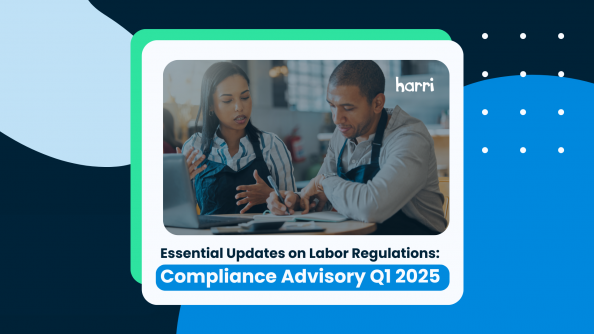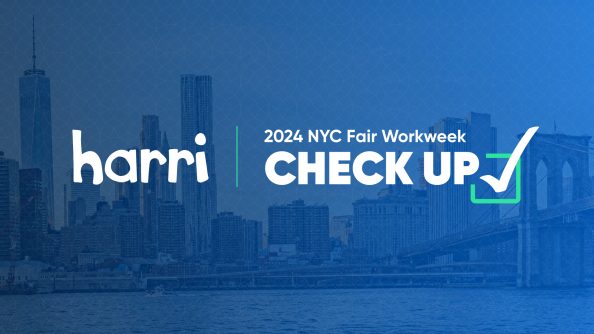2023 Year in Review: Compliance Advisory
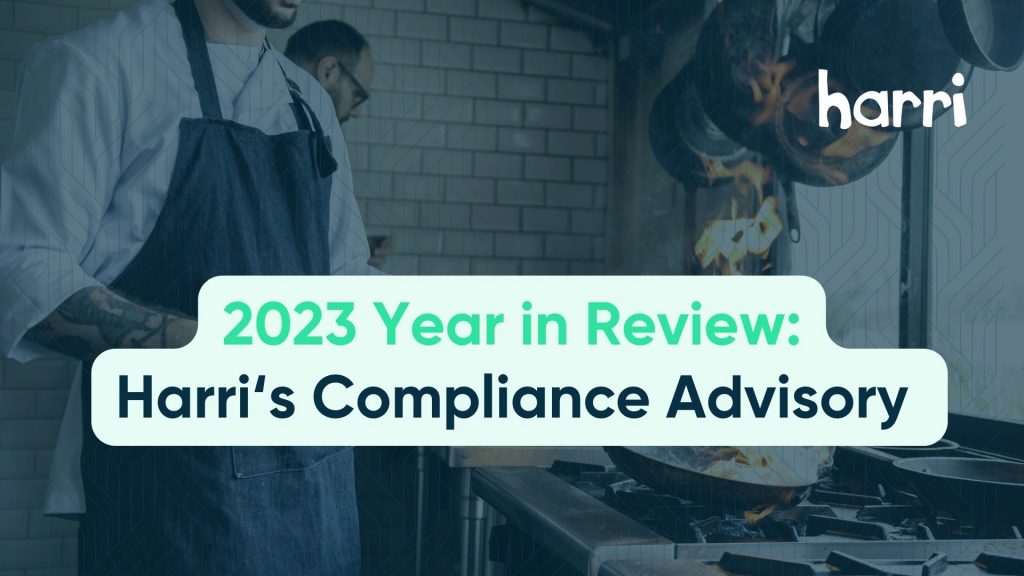
- By Harri Insider Team | January 18, 2024
In this comprehensive retrospective of 2023, we revisit the pivotal legislative changes and advancements made by Harri to support our clients across various regulatory domains. Focused on Employment Verification, Salary Transparency, Fair Workweek, and the One Day Rest in Seven Act (ODRISA), it encapsulates the measures taken by Harri to ensure your organization’s adaptation to the legislative changes of the past year.
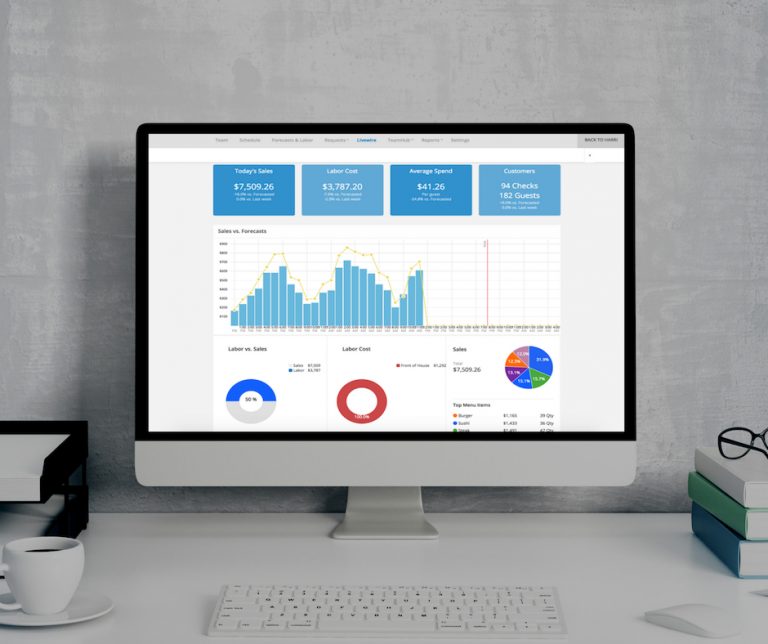
Employment Verification
Last year, the U.S. Citizenship and Immigration Services (USCIS) introduced a new version of Form I-9, reshaping employment verification processes. Harri seamlessly integrated this update, empowering our clients to incorporate the revised USCIS Form I-9 during onboarding effortlessly.
USCIS Form I-9 and Alternative Procedure
U.S. Citizenship and Immigration Services (USCIS) announced a new version of Form I-9, Employment Eligibility Verification. Employers were permitted to begin using the latest edition beginning August 1, 2023, and were required to use the new form on November 1, 2023. In addition, the U.S. Department of Homeland Security published a notice in the Federal Register that modernizes employment eligibility verification by allowing E-Verify employers to remotely examine Form I-9 documents starting August 1, 2023, provided they follow specific steps. Employers must participate in E-Verify and be in good standing to examine their employees’ documents remotely.
How Harri Supports USCIS Form I-9
Harri implemented the new I-9 Form for all clients subscribed to our Talent Acquisition services to accommodate the update. Clients can upload this form to a candidate’s profile during onboarding and before their first day of employment.
Salary Transparency
In 2023, California, New York, Rhode Island, and Washington enacted salary transparency legislation. Harri promptly responded to these changes by incorporating features to ensure compliance and transparency for our clients operating in these jurisdictions. A brief description of each jurisdiction’s requirements is available below.
California
Effective January 1, 2023, California employers, irrespective of their location, are mandated to disclose pay ranges in all job postings. Even companies with remote employees or just one employee in the state are subject to this regulation. Notably, third-party postings do not exempt employers from providing pay range information.
New York
Starting September 17, 2023, businesses in New York with four or more employees must disclose compensation ranges for specific job opportunities, promotions, and transfers. This requirement applies to positions performed within New York or positions that allow remote work in the state.
Rhode Island
Beginning January 1, 2023, upon their request, Rhode Island employers must provide applicants with wage range information for the position to which they are applying. Employers are also mandated to give the employees the wage range for their position at the time of hire and when they move to a new position. If an employee inquires about their position’s wage range while employed, the employer must provide the employee with this information.
Washington
From January 1, 2023, Washington requires employers with fifteen or more employees to disclose salary ranges and benefits in each job posting. The definition of “posting” is broad, encompassing both printed and electronic solicitations for job applicants. Additionally, upon request, employers must provide the wage scale or salary range to employees considering internal transfers or promotions.
Harri Supports Compliance with New Wage Transparency Laws
In response to the latest legislative changes, Harri now requires clients operating in affected jurisdictions to include compensation information in job postings, facilitating adherence to the new wage transparency laws.
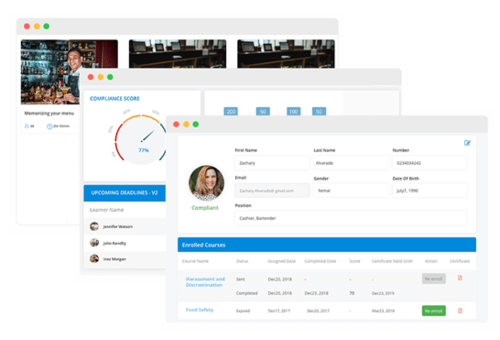
Fair Workweek
The concept of fair scheduling gained momentum across various jurisdictions last year, and Harri diligently updated its functionalities to align with new requirements. In Los Angeles, Evanston, Berkeley, and Tukwila, we seamlessly supported the implementation of their fair scheduling laws.
Our enhancements, introduced in 2023, include jurisdiction-specific functionalities, such as LiveSchedule, which allows clients to display available shifts, and Final Fair Workweek Pay, streamlining the resolution of premiums based on the employee’s termination circumstances.
Jurisdictions with New Fair Scheduling Legislation
Berkeley
Operative Date: January 12, 2024
The Berkeley Fair Workweek Ordinance, enacted in December 2022, introduces crucial modifications for covered employers primarily engaged in the restaurant industry. This ordinance applies to businesses with 100 or more global employees or franchises associated with a network of franchises employing 100 or more employees globally.
Key Requirements
- Good Faith Estimates: Employers must provide employees with a written good-faith estimate of their work schedule, including an initial work schedule for new employees. Additionally, employees reserve the right to request schedule modifications, with employers mandated to respond in writing.
- Advance Notice of Work Schedules: Employers must provide a minimum of two weeks (14 days) notice for employee work schedules. Special provisions are in place for victims of domestic or sexual violence.
- Offer of Additional Hours: Before hiring new employees, employers must extend the opportunity for additional work hours to existing part-time employees.
- Right to Rest: Employees can decline work hours less than 11 hours after the end of the previous shift. A special pay provision exists for those who agree to work such a shift.
- Predictability Pay: Employees can decline any previously unscheduled hours with less than 14 days’ notice. Furthermore, predictability pay is now mandatory for schedule changes within this timeframe.
Evanston
Effective Date: January 1, 2024
Initially effective on September 1, 2023, the Evanston Fair Workweek Ordinance underwent a modification, changing its effective date to January 1, 2024.
Key Requirements:
- Covered Employers: The ordinance applies to hospitality and retail employers with 100 or more employees globally. For the food service and restaurant industries to be covered, they need a minimum of 30 locations globally and at least 200 employees.
- Good Faith Estimates: Employers must provide a written good faith estimate (GFE) projecting the first 90 days of employment. This estimate must include weekly hours, on-call shifts, and expected work times.
- Advance Notice of Work Schedules: Employers must provide a minimum of two weeks (14 days) notice for employee work schedules, with provisions for victims of domestic or sexual violence.
- Offer of Additional Hours: Before hiring new employees, employers must extend the offer of additional hours to qualified existing part-time employees.
- Right to Rest: Employees can decline work hours less than 11 hours after the end of the previous shift. A special pay provision exists for those who agree to work such a shift.
- Predictability Pay: Employees can decline previously unscheduled hours added with less than 14 days’ notice. Predictability pay is required for schedule changes within this timeframe.
Los Angeles
Effective Date: April 1, 2023
The Los Angeles Fair Work Week Ordinance applies to covered employers identified as retail businesses in the North American Industry Classification System (NAIS) with 300 or more global employees.
Key requirements:
- Good Faith Estimates (GFE): Employers must provide new employees with a written Good Faith Estimate of their work schedule before hiring. Employers must also provide this estimate within ten days of the employee’s request in the case of existing employees.
- Advance Notice of Work Schedules: Employers must provide employees with written notice of work schedules at least 14 calendar days before the work period begins. Employees can decline any hours, shifts, or changes in work location made after this advance notice deadline.
- Offer of Additional Hours: Employers must offer additional hours to qualified existing employees before hiring new employees.
- Right to Rest: Employees are not required to work a shift that begins within 10 hours of their last shift without written consent. Those who agree are entitled to compensation at a rate of time-and-a-half for the shift following the inadequate rest period.
- Predictability Pay: Employees are entitled to Predictability Pay for employer-initiated changes to work schedules made less than 14 days before the work period begins. Unless certain exceptions apply, employees retain their right to Predictability Pay even if they voluntarily agree to such changes.
Tukwila
Effective Date: July 1, 2023
Initiative No. 1, approved by Tukwila voters in 2022, requires employers with at least 15 employees and a gross revenue over $2 million generated within the city limits to offer additional hours to non-exempt employees covered by the state’s minimum wage laws. Employers with at least 15 employees and a gross revenue over $2 million generated within the city limits must offer additional hours to non-exempt employees covered by the state’s minimum wage laws.
Key requirements:
- Before a covered employer can hire additional employees, they must offer additional work hours to existing qualified part-time employees.
How Harri Supports New Fair Scheduling Legislation
In 2023, Harri implemented functionality and workflows corresponding to the requirements of the following jurisdiction’s Fair Workweek Ordinances:
- Los Angeles, CA
- Evanston, IL
- Berkeley, CA
- Tukwila, WA*
To enable these rules, select the appropriate jurisdiction from the jurisdiction dropdown under “FWW Premiums” in TeamLive Settings. Once enabled, premiums for schedule changes, warnings, and consent requests can be triggered when scheduling.
Covered employers in the above jurisdictions can also integrate the appropriate Good Faith Estimate into employee onboarding.
*Access to Hours only. (See LiveSchedule below)
Harri Enhancements to Existing Fair Workweek Functionality
NYC & Philadelphia Fair Workweek Enhancements
Harri also made significant enhancements and updates to existing workflows corresponding to the Philadelphia and New York City’s Fair Workweek Ordinances requirements.
Clients in New York City who are required to comply with the NYC Fair Workweek Ordinance are encouraged to explore the following functionalities that were made available in Harri in 2023:
- Employees can now provide pre-shift consent to work an extended shift at clock-in instead of within 15 minutes following their scheduled end of shift.
- The Regular Schedule Variances page allows employers to document any exceptions for employees whose work schedule has a variance greater than 15% of their regular schedule.
Clients in Philadelphia who must comply with the Philadelphia Fair Workweek Ordinance are encouraged to explore newly available functionality in Harri in 2023:
- 24-Hour Window, a setting developed specifically for Philadelphia, ensures any schedule changes made within the 24 hours following the start of the advance notice period do not trigger a schedule change premium.
Universal Fair Workweek Enhancements
LiveSchedule
Harri rolled out LiveSchedule, a tool to support the Access to Hours requirement of many Fair Workweek Ordinances. LiveSchedule allows clients to display their available shifts to existing employees on a monitor in their place of business. LiveSchedule maintains an up-to-date and current display of all available shifts and tracks how much time each available shift has been open to existing employees.
Final Fair Workweek Pay
Many Fair Workweek jurisdictions prescribe when an employer must pay a reduction in hours premium in the event of a termination. To assist with this process, Harri developed functionality that automates the premium resolution or confirmation review based on the employee’s basis for termination.
One Day Rest in Seven Act (ODRISA)
Illinois amended its One Day Rest in Seven Act to require the provision of 24 hours of consecutive hours of rest during every seven-day period for non-exempt employees, rather than every calendar week, and provide an additional meal period of 20 minutes for each additional 4.5 hours of work after an employee works 7.5 hours. (SB 3146).
How Harri Supports ODRISA
Employers may utilize the existing Day of Rest setting in TeamLive to alert them when an employee has not been scheduled with a 24-hour rest period within a consecutive 7-day period.







